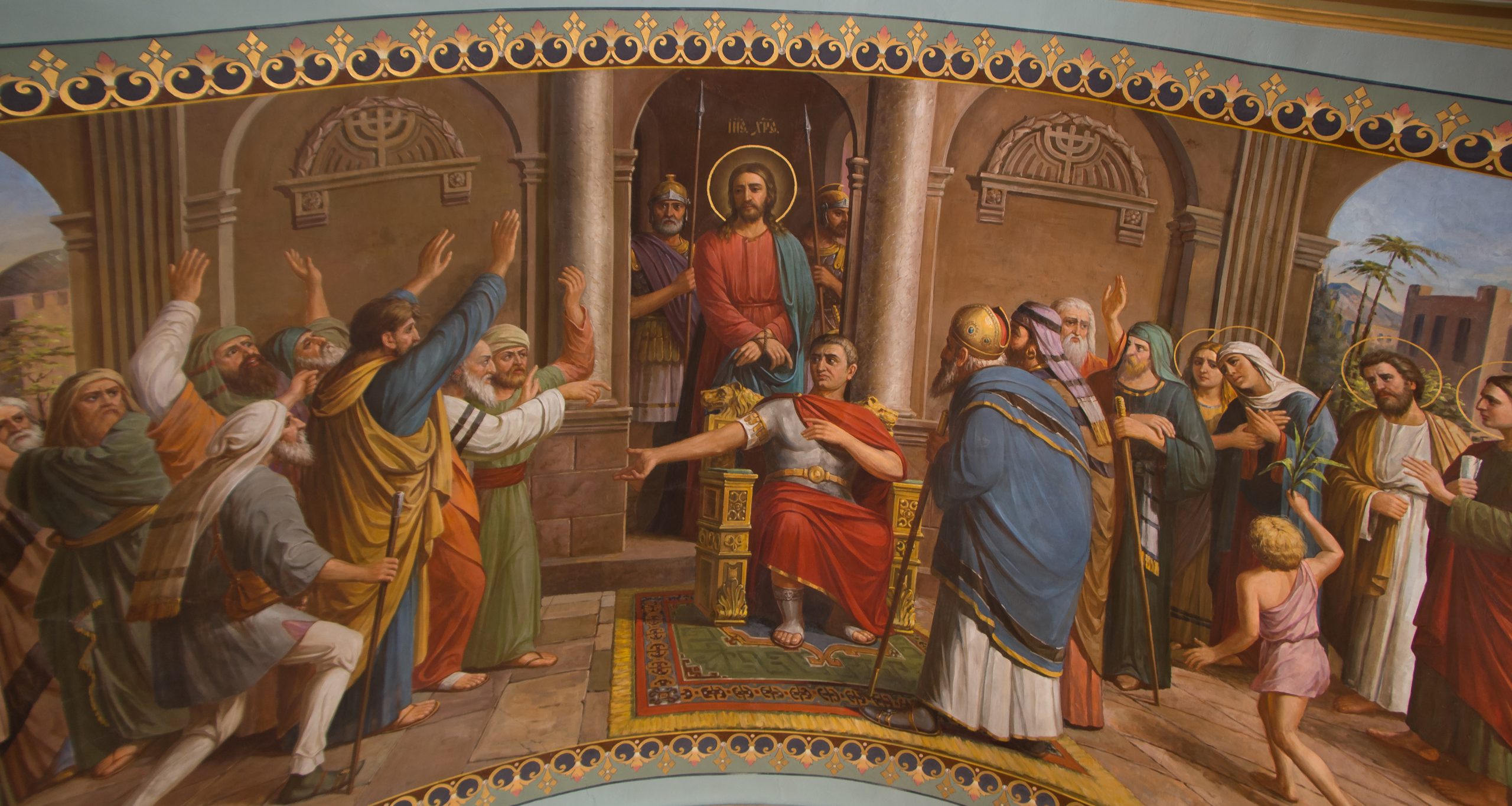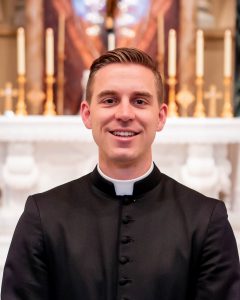
Image of Jesus Christ in the court of king Herod
By Laurie Stiegelmeier
After a 50-year friendship, my dearest friend called to confess that she and her husband no longer believe in any religion. Being Catholic was one of the foundations of our friendship at its beginning and sharing our faith saw us through challenging times in our individual lives.
Asking for her reasons, she answered that it is because the Church is exclusive; in her view, it does not welcome those who disagree with her teachings or fail in living up to them. One example is that she has come to believe that homosexuality has always been normal, healthy behavior, and we are just beginning to understand that now. She is not sure if her husband, children and grandchildren believe in God; she does and hopes to go to heaven, but thinks there are other ways to get there than the Catholic Church.
I heard sadness in her voice as she professed the ideals of relativism. Her joy was gone. Behind her words was the long-resounding echo of Pontius Pilate: “What is truth?” (Jn 18:38).
Pilate vs. Plato
According to Father James Brent, OP in an “Aquinas 101” video on knowing truth, skeptics (those who doubt humans can actually know what is true and have knowledge) and relativists (those who claim truth is a matter of individual preference based on social norms) have existed in cultures throughout time. In ancient Athens, Sophists promoted skepticism and relativism, mostly for political purposes. He says that Socrates, Plato and Aristotle developed their lifestyle and philosophy to combat the Sophists’ teaching, which is really a form of despair.
It seems Pilate was unaware of (or didn’t care about) these great Greek thinkers who founded their philosophy on an eternal, unchanging truth that corresponds to facts of reality and remains the same regardless of time or individual perspectives. They taught that human beings don’t invent truth, they know it through discovery.
To counteract her despair, what hope can I offer my friend? How can I help her discover truth?

Perceiving truth
St. Thomas Aquinas said that knowledge first begins in the senses. Father Zach Schaefbauer, parochial vicar of Pastorate 23, explained it this way: Any thought we have is the result of sensory perception. We could not imagine a pink tree without ever having seen a tree or the color pink. Every thought is based on sensory perception of objects that exist as part of reality, a reality that exists outside of the human mind. He said this is the basis for sciences such as physics and biology.
“A proper understanding of human knowledge is this: That the human mind does not create reality. Rather, it gains information from reality and thereby begins to understand the world outside of itself,” Father Schaefbauer said. “Understanding of the world around us is called truth.”
Through observation of the natural world, fundamental principles become obvious. Father Schaefbauer uses the example of an acorn to show the principle that all things act for an end.
“An acorn exists, not simply as a static acorn, but as a seed inclined to become an oak tree,” he said. “Thus, we can recognize that the end which a thing moves toward is at the same time its perfection. In other words, the perfection of the acorn is in becoming a fully mature oak tree that bears more acorns. Can we conclude, therefore, that an acorn is good if it becomes an oak tree? Of course, for what else is an acorn supposed to do? Its perfection or completion lies in becoming an oak tree. So, any ‘movement’ away from becoming an oak tree is bad for the acorn.”
To summarize this truth, Father Schaefbauer said that if all things in the world act for their own perfection, we can know that moving toward perfection is good while moving away from it is evil.

Truth in human nature
Reality in the natural world also applies to humans. According to Father Schaefbauer, there are three aspects of human nature.
“First, humans have the power to grow and reproduce; they share this in common with plants and animals,” he said. “Second, humans have sensory powers, shared only with other animals. Yet, humans have a third power that they do not share with plants or animals. Human beings have the ability to know and will freely. Only human beings can ask the question ‘Why?’ or gain self-awareness of one’s own existence and do mathematical problems. Within the individual human nature is a collection of the powers of the natural world, and yet something that is beyond it. This is why philosophers throughout the centuries have called human beings ‘rational animals.’”
Father Schaefbauer said that because the human being is a unified individual, all aspects of their nature are subject to the highest power—the power of reason. All animals must eat; lower animals eat according to their senses, looking for suitable food and eating when they are hungry. A person eats rationally, choosing when and when not to eat, and what and how much to eat depending on circumstances. “A human being only acts like a human being when he does so rationally, according to reason,” he said.
“But of course, this begs another question: what does it mean to act according to reason?” Father Schaefbauer continued. “This seems to suppose that reason is a kind of rule, something that human beings are supposed to measure up to. This measurement, or rule, is traditionally referred to as the natural law.
“The natural law is the way in which human beings are to act if they are to fulfill their human nature. It is called a ‘law’ since it provides the guidelines for human action. It is called ‘natural’ since it is part of human nature. It is the very thing that will conform a human person to their perfection, but only if the person freely chooses to follow these ordinances of reason.” Father Schaefbauer added that we can know natural law is unchanging since it is a principle found universally in all humans.
St. Paul, in his letter to the Romans (2:14-15), wrote, “For when the Gentiles who do not have the law by nature observe the prescriptions of the law, they are a law for themselves even though they do not have the law. They show that the demands of the law are written in their hearts, while their conscience also bears witness and their conflicting thoughts accuse or even defend them …”
“It is important to remember that all moral truth is grounded in the natural law and depends on first understanding that human beings exist in a well-ordered cosmos where all creatures function according to principles of the natural world,” Father Schaefbauer summarized. “Goodness and badness are objective realities based on the perfection of each nature and cannot be determined by individual or group preference. To act according to human nature is to do God’s will. To act against human nature is to act against God. Law helps us to see the good to be pursued
and the evil to avoid.”
Law and order
The order within nature is supplemented and clarified by laws that come from legitimate authority. Human positive laws are regulated by the government for its citizens. Familial law are rules within family life. These laws may vary from place to place or over time, like speed limits, tax rates, curfews and bedtimes.
Divine positive law comes from God—the highest authority—through Revelation. The Ten Commandments, the precepts of Jesus Christ, and the precepts of the Church are divine positive laws. Because God is eternal and unchanging, we can know that divine positive law does not change with time or from person to person. St. Paul tells us in Hebrews 13:8, “Jesus Christ is the same yesterday, today and forever.”
And in Matthew 5:17-20, Jesus said, “Think not that I have come to abolish the law and the prophets; I have come not to abolish them but to fulfill them. For truly, I say to you, till heaven and earth pass away, not an iota, not a dot, will pass from the law until all is accomplished. Whoever then relaxes one of the least of these commandments and teaches men so, shall be called least in the kingdom of heaven; but he who does them and teaches them shall be called great in the kingdom of heaven. For I tell you, unless your righteousness exceeds that of the scribes and Pharisees, you will never enter the kingdom of heaven.”
Explaining divine positive law as it relates to humanity, Father Schaefbauer said that even within the realm of faith, when God delivered the Ten Commandments to the Israelites, which Catholics still hold to today, the commands are not impositions on human nature, but rather reveal to sinful humanity how to act like human beings.
“‘Thou shalt not kill’ is commanded because it is contrary to reason for a human being to kill an innocent human person,” Father Schaefbauer said. “‘Thou shalt not bear false witness’ condemns lying since human beings are meant to know truth and not detract from it. Even the first and third commandments, ‘no other gods except the one True God’ and ‘keep holy the Sabbath,’ are given because human reasoning is supposed to conclude that there is only one God, and that it is good for creatures to worship their Creator.”
The end matters
Father Schaefbauer explained that without an end, there is no reason for action or even existence. “If I play the game of basketball, the primary goal is to play, then to play well, and then to win. Without any of those ‘ends’ or ‘objectives,’ it is unreasonable for me to begin.”
Without an end, there is no beginning. The acorn has no reason to exist or act. This is the despair of relativism which seeks the false happiness of self-will.
“Conformity to law brings the human being to perfection, to happiness,” Father Schaefbauer said. “To know what is true, to do what is good and avoid what is evil is to conform to God’s plan for creation—a plan for good, a plan for perfection.”
Humans begin by pursuing happiness, but nothing satisfies long, so we must continually seek it.
“So, true happiness must be a state of complete satisfaction,” Father Schaefbauer said. “That is, all our desires find rest and no longer strive to be satisfied. Since our desires can stretch into infinity—through knowledge and love—only something that is infinite and perfectly good can satisfy us completely.”
Aristotle and other philosophers concluded, through reason, that the one, perfect, Divine Being is the natural end of all things since all things seek to imitate him (God). However, Revelation and faith show us our supernatural end.
Father Schaefbauer said, “With the help of God’s Revelation, the Catholic faith understands that through Baptism into the Body of Christ, the end and perfection of human beings is sharing in the very life of God.”
St. Augustine wrote, “You have made us for yourself, O Lord, and our hearts are restless until they rest in you.” With that as our
end goal, there is purpose, law and fulfillment. There is hope.
We must answer Pilate’s question in our world today. Truth underpins all of creation, giving it order through laws of nature; our reason and free will allow us to know it. It is the unchanging foundation of all God’s revelation of himself present in the Bible and his Church.
Truth is what we are made for and long for. It is what will lead us to our perfect end—the happiness for which we were begun.
Holy Spirit, please give us the eyes to see, the will to obey, and the courage to defend truth.
Laurie Stiegelmeier is active in faith formation for all ages at St. John de Britto Church, Britton/Pastorate 5. Above career and volunteer work, being a mother and grandmother is the most important and rewarding “job” she ever held.


